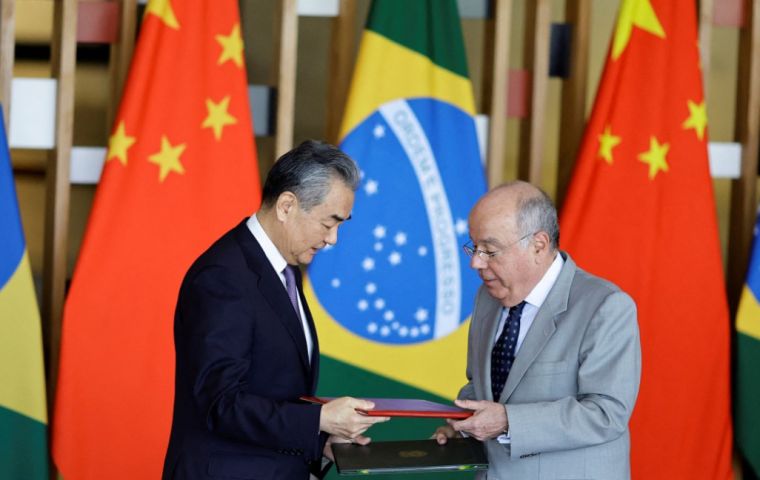MercoPress. South Atlantic News Agency
Brazil assures Beijing of its adherence to the “Once China Principle”
 Vieira said that the “dynamism of Sino-Brazilian relations is also an expression of a new world in the making”after his second day of talks with Wang Yi
Vieira said that the “dynamism of Sino-Brazilian relations is also an expression of a new world in the making”after his second day of talks with Wang Yi Brazil's government of President Luiz Inácio Lula da Silva ratified the South American country's “unequivocal” adherence to the “One China Principle” regarding Taiwan, which Beijing regards as a rogue province. The message was conveyed Friday in Brasilia to Foreign Minister Wang Yi.
“We recall Brazil's historic, consistent, and unequivocal support for the one-China principle,” said Brazilian Foreign Minister Mauro Vieira. In response, China's top diplomat thanked “all Brazilian institutions” for their stance.
In April last year, Lula met with his Chinese colleague Xin Jinping in Beijing to relaunch the bilateral ties hampered during the Jair Bolsonaro years.
In the new geopolitical scenario, Wang Yi explained China's intentions to hook up Brazil's PAC (Growth Acceleration Program) to international investments through the Belt and Road initiative, also referred to as the Silk Road. The Chinese initiative, launched by Xi Jinping in 2013, envisions a global network of railroads, waterways, highways, ports, and airports to transport products.
In a speech at the Itamaraty Palace on Friday, Wang Yi suggested that the governments of Brazil and China should work together to bring the objectives “between the Belt and Road initiative and Brazil's PAC” closer together. Wang Yi also advocated more openness, inclusion, and cooperation between the two government programs and mentioned that Sino-Brazilian partnerships include soybeans and space exploration, which would prove that mutual interests go beyond agricultural cooperation, the green economy, the digital economy, artificial intelligence, and other areas.
In response to the Belt and Road, the US launched last year a partnership with India, the European Union, Saudi Arabia, and the United Arab Emirates to establish an India-Middle East-Europe Economic Corridor.
Also Friday, Vieira confirmed that Xi Jinping would be traveling to Rio de Janeiro in November for the G-20 Summit after canceling his appearance in New Delhi last year.
During Wang Yi's two-day visit to the South American country, both foreign ministers signed an agreement to extend the duration of travel visas from 5 to 10 years and with multiple entries, which will facilitate travel and the promotion of contacts between businesspeople, as well as boosting tourism. The opening of a Brazilian consulate in Chengdu was also discussed.
Vieira said that the “dynamism of Sino-Brazilian relations is also an expression of a new world in the making” and stressed that the countries share interests and visions of the world.
Wang Yi is due back in Brazil on Feb. 21-22 for the G-20 foreign ministers' meeting in Rio de Janeiro while Vieira said he had accepted an invitation from Wang Yi to visit Beijing within the next three months.




Top Comments
Disclaimer & comment rules-

-

Read all commentsThe further Brasil can distance itself from the crippling effects of US empire the better its future will be. US has kept all of Latin America poor so it was able to transfer wealth from it for the past 100 years or so. In the form of cheap labor and commodities.
Jan 20th, 2024 - 06:15 pm 0So, China can keep Tibet, get Taiwan and the S. China sea and Brazil is ok with all this, after all it doesn’t cost Brazil anything, its other people’s rights that are being sacrificed.
Jan 20th, 2024 - 01:28 pm -1Human rights sacrificed on the altar of economic self-interest.
So much for Lula being a ‘humanitarian’, quite happy to sell other people, their land, resources and rights to the Chinese when profitable for him to do so.
Commenting for this story is now closed.
If you have a Facebook account, become a fan and comment on our Facebook Page!